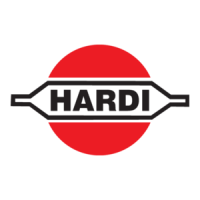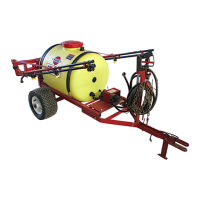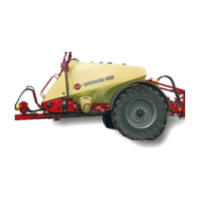52 HARDI
®
N-SERIES 3-PT SPRAYER DIAPHRAGM OPERATOR'S MANUAL
Cleaning
1. Dilute remaining spray liquid in the tank with at least 10 parts water
and spray the liquid out in the fi eld you have just sprayed.
Note: It is ad vis able to in crease the forward speed (dou ble if possible)
and reduce the pressure.
2. Select and use the ap pro pri ate protective clothing. Select detergent
suitable for cleaning and suit able de ac ti vat ing agents if necessary.
3. Rinse and clean sprayer and tractor ex ter nal ly. Use de ter gent if
necessary.
4. Remove all fi lters and clean them. Be careful not to damage the
mesh. Replace fi lters when the sprayer is completely clean.
5. With the pump running, rinse the inside of the tank. Re mem ber the
tank roof. Rinse and operate all com po nents and any equipment that
has been in contact with the chemical.
6. After spraying the liquid out again in the fi eld, stop the pump and fi ll
at least 1/5 of the tank with clean wa ter. Note that some chemicals
require the tank to be com plete ly fi lled. Add appropriate detergent
and/or deactivating agent, e.g. Washing soda or Triple ammonia.
Note: If a cleaning pro ce dure is given on the chemical label, follow it
closely.
7. Start the pump and op er ate all controls en abling the liquid to come
in contact with all the components. Leave the dis tri bu tion valves until
last. Some detergents and de ac ti vat ing agents work best if left in the
tank for a short period. Check the label.
8. Drain the tank and let the pump run dry. Rinse inside of tank, again
letting the pump run dry.
9. Stop the pump. If the chemicals used have a tendency to block
nozzles, re move and clean them now.
10. Replace all fi lters and noz zles and store the sprayer. If, from previ-
ous experiences, it is noted that the solvents in the chemicals are
particularly ag gres sive, store the sprayer with the tank lid open.
Note: If the sprayer is cleaned with a high pres sure cleaner we recom-
mend lu bri ca tion of the entire machine (Section 6.8).

